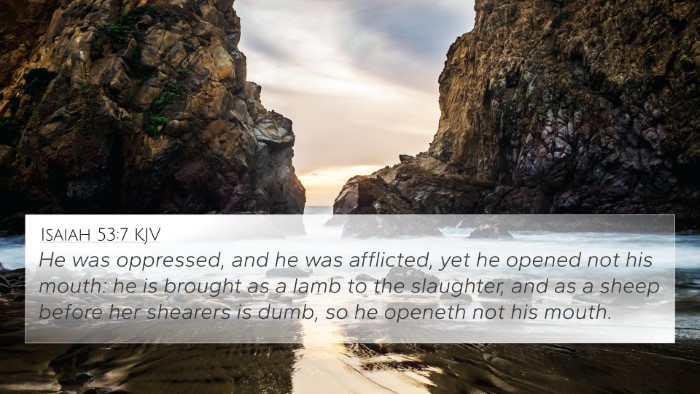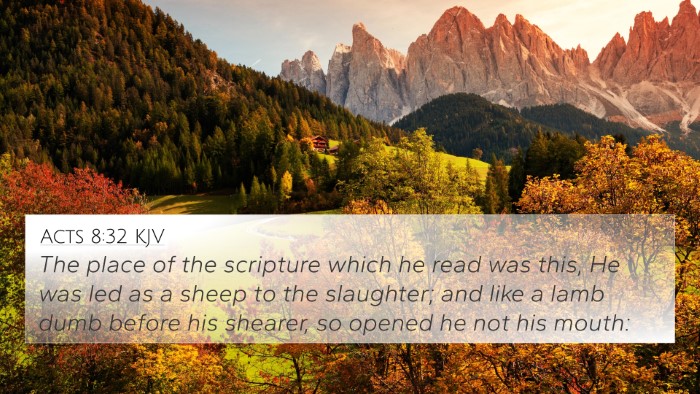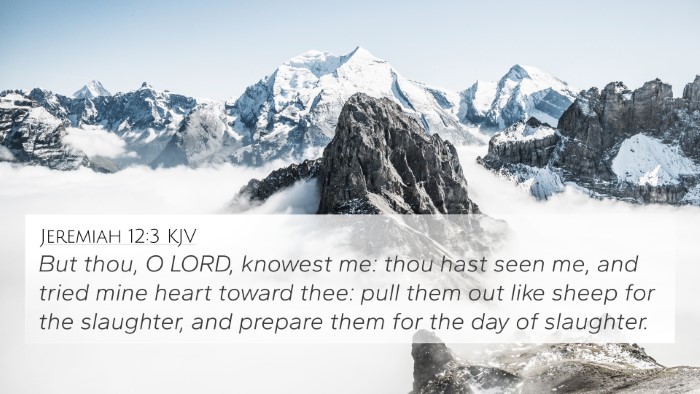Understanding Romans 8:36
Romans 8:36 states, "As it is written, For thy sake we are killed all the day long; we are accounted as sheep for the slaughter." This verse encapsulates the suffering endured by believers for their faith. To fully understand its meaning, we can draw insights from several public domain commentaries including those of Matthew Henry, Albert Barnes, and Adam Clarke. Below we explore their interpretations and connect this verse with related scriptures.
Meaning and Interpretation
Matthew Henry's Commentary: Henry emphasizes the continual trials faced by Christians. He points out that this quote originates from Psalm 44:22, where the suffering of God's people is highlighted. It reflects the reality that believers often experience persecution for their faith, akin to sheep led to the slaughter. This often manifests in various forms, including social ostracism and literal persecution.
Albert Barnes' Notes: Barnes provides a deeper insight into the implications of this verse in the broader context of Christian suffering. He notes that the Apostle Paul is communicating the idea that despite the adversities and tribulations believers face, they do not diminish God's overarching purpose and love for them. The reference to being 'accounted as sheep for the slaughter' serves as a stark reminder of the cost of discipleship.
Adam Clarke's Commentary: Clarke expands upon the metaphor of sheep and emphasizes the instinctual nature of sheep—alluding to the straightforwardness and vulnerability of believers. He correlates this vulnerability with the challenges Christians endure, paralleling the historical sufferings of the faithful with their present reality. Clarke also reflects on God's assurance despite these sufferings.
Thematic Connections
Romans 8:36 connects significantly with several themes within scripture, particularly around suffering, sacrifice, and the faithfulness of God.
- 1. Psalm 44:22: "Yea, for thy sake are we killed all the day long; we are counted as sheep for the slaughter."
- 2. Matthew 10:16: "Behold, I send you forth as sheep in the midst of wolves..." This shows the believer's vulnerability in the world.
- 3. John 10:11: "I am the good shepherd: the good shepherd giveth his life for the sheep." Jesus’ sacrificial love reassures believers of their worth.
- 4. Philippians 1:29: "For unto you it is given in the behalf of Christ, not only to believe on him, but also to suffer for his sake." This affirms that suffering is a part of the Christian experience.
- 5. 2 Timothy 3:12: "Yea, and all that will live godly in Christ Jesus shall suffer persecution." This reiterates the promise of struggles alongside faith.
- 6. 1 Peter 4:12-13: "Beloved, think it not strange concerning the fiery trial which is to try you..." This verse encourages believers not to be surprised by their sufferings.
- 7. Revelation 7:14: "These are they which came out of great tribulation..." This highlights the ultimate triumph of believers despite their trials.
Cross-Referencing Biblical Texts
Cross-referencing offers a way to see how different scripture passages relate to one another. In light of Romans 8:36, we observe interconnected themes of suffering and divine assurance throughout the Bible. The following tools and methods can enhance your understanding:
- Bible Concordance: A great tool to find where themes of suffering and faith appear across the Bible.
- Bible Cross-Reference Guide: Helps identify connections between verses that deal with similar themes.
- Comparative Bible Verse Analysis: Analyzing how different books of the Bible approach the topic of suffering.
- Cross-Reference Bible Study: Grouping verses related to suffering and sacrifice can lead to deeper insights.
- Inter-Biblical Dialogue: Exploring how Old Testament verses, such as those in Psalms, relate to New Testament writings.
Conclusion
Romans 8:36 profoundly illustrates the cost of discipleship, echoing the sentiments of suffering among believers. By employing tools for cross-referencing, readers can engage in deeper study and understanding of biblical themes. The theme of suffering as a path to glory is common across both Old and New Testaments, encouraging believers amidst their trials. Engaging with scripture in this way fosters a rich understanding of how each verse contributes to the overarching narrative of faith, resilience, and God's unwavering promise.
Further Reflections
As we contemplate Romans 8:36, let us remember the assurance given in the surrounding verses (Romans 8:37-39), which affirm that in all these things, we are more than conquerors through Him who loved us. Therefore, suffering is not the end, but rather a passageway to a greater revelation of God’s love and purpose in our lives.














